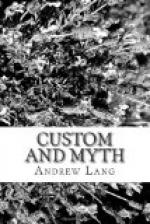The Evidence from Totemism.—Totemism is the name for the custom by which a stock (scattered through many local tribes) claims descent from and kindred with some plant, animal, or other natural object. This object, of which the effigy is sometimes worn as a badge or crest, members of the stock refuse to eat. As a general rule, marriage is prohibited between members of the stock—between all, that is, who claim descent from the same object and wear the same badge. The exogamous limit, therefore, is denoted by the stock-name and crest, and kinship is kinship in the wolf, bear, potato, or whatever other object is recognised as the original ancestor. Finally, as a general rule, the stock-name is derived through the mother, and where it is derived through the father there are proofs that the custom is comparatively modern. It will be acknowledged that this sort of kindred, which is traced to a beast, bird, or tree, which is recognised in every person bearing the same stock-name, which is counted through females, and which governs marriage customs, is not the sort of kindred which would naturally arise among people regulated on the patriarchal or monandrous family system. Totemism, however, is a widespread institution prevailing all over the north of the American continent, also in Peru (according to Garcilasso de la Vega); in Guiana (the negroes have brought it from the African Gold Coast, where it is in full force, as it also is among the Bechuanas); in India among Hos, Garos, Kassos, and Oraons; in the South Sea Islands, where it has left strong traces in Mangaia; in Siberia, and especially in the great island continent of Australia. The Semitic evidences for totemism (animal-worship, exogamy, descent claimed through females) are given by Professor Robertson Smith, in the ‘Journal of Philology,’ ix. 17, ’Animal Worship and Animal Tribes among the Arabs, and in the Old Testament.’ Many other examples of totemism might be adduced (especially from Egypt), but we must restrict ourselves to the following questions:—




